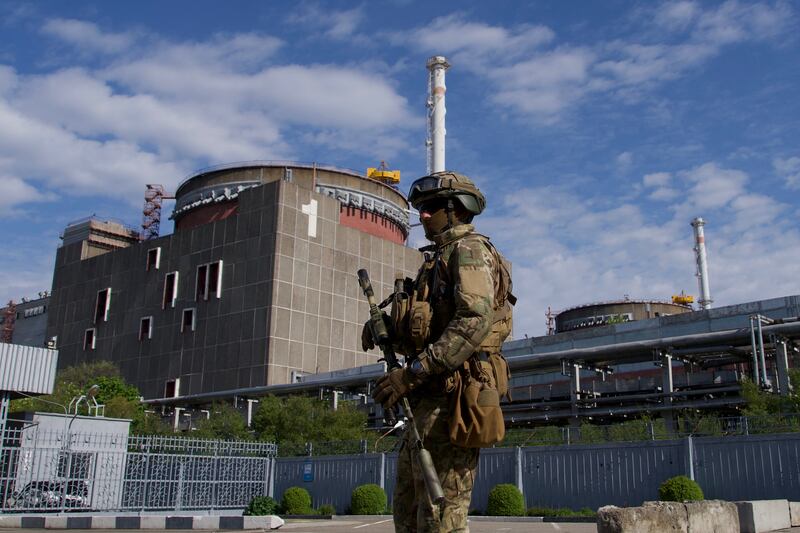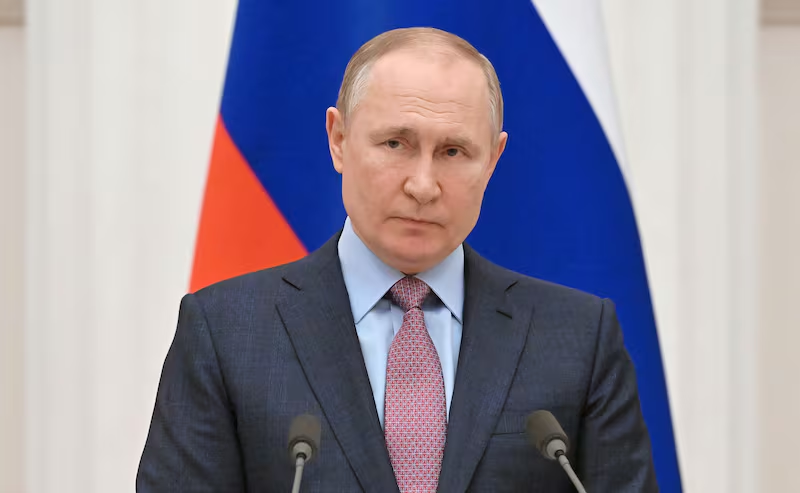To Russia’s long list of crimes against humanity associated with its invasion of Ukraine, we must add nuclear terrorism. While many worried that Russia might use nuclear weapons if the war grew more desperate for them—and senior U.S. government officials do not rule that possibility out—Moscow has already done something that could have similarly catastrophic consequences.
In early March, Russian forces seized the Zaporizhzhia nuclear power station. Since then, they have taken a number of steps, each of which has raised the risk of a nuclear disaster. They have turned the facility into a military base. They have mined parts of the facility. They have interfered with the staff, placed them under duress, arrested them and played havoc with the plant’s chain of command. They have used the facility as a base from which to launch attacks on Ukraine. They have also attacked parts of the facility themselves and sought to blame the attacks on Ukraine’s military.
Reclaiming the facility would be extremely dangerous. UN Secretary-General Antonio Guterres, after a ceremony to mark the 77th anniversary of the atomic bombing of Hiroshima, said, “Any attack to a nuclear plant is a suicidal thing.”
Nonetheless, in a speech on Saturday, Ukraine’s President Vladimir Zelensky said, “Every Russian soldier who either shoots at the plant or shoots using the plant as cover, must understand that he becomes a special target for our intelligence agents, for our special services, for our army.” Ukraine asserts Russian artillery struck a number of buildings at the plant, knocked one reactor off-line, ignited a fire, triggered the activation of an emergency power protection unit, and in so doing, raised the risks of fires or even potential radiation risks—although none has been reported so far.
The international community has escalated calls for Russia to leave the facility. Petro Kotin, head of Energoatom (the state-run company that administers Ukraine's nuclear plants), called for Russia to leave the plant and for there to be established “some type of no-military zone around it.” He also warned of the disaster that might ensue should rockets hit spent fuel being stored at the plant. Rafael Mariano Grossi of the International Atomic Energy Agency (IAEA) told the UN Security Council that the “situation at Zaoprizhzya NPP was alarming” and called for an IAEA mission to “carry out needed technical activities and provide a stabilizing influence.” At the UN Security Council meeting on the subject, a senior U.S. official asserted concern about the situation was universal, even from countries that have been reluctant to choose sides in the Ukraine conflict.

A Russian serviceman patrols the territory of the Zaporizhzhia Nuclear Power Station in Energodar on May 1.
Andrey Borodulin/AFP via GettyWhile experts note that Zaporizhzhia’s six reactors are well shielded by their hardened concrete housings, the shelling could trigger fires or, perhaps, operator error. This, in turn, could lead to a breakdown of cooling systems and, should that not be contained (a complex process that becomes more difficult in the context of an on-going shooting war), could lead to a meltdown.
A senior U.S. official with whom I spoke said, “The situation is very fragile. The longer the staff goes in these very stressful circumstances, the longer the facility goes without the IAEA being able to support the security of the plant, every day that passes makes it more fragile.” The official added, “The thing I am most concerned about is the inadvertent fog of war or poorly disciplined troops or weapons malfunctioning leading to a disaster.” Even if that is not the goal of the Russians, the official noted, stressing that it is in the interest of neither side to see the plant destroyed, the risk of unintended consequence has risen immeasurably given Moscow’s reckless tactics.
When asked what could be done to reduce the risk, the official (an expert in nuclear energy matters) kept it simple: “The risk could be reduced to zero by Russia withdrawing.”
Emma Belcher, president of the Ploughshares Fund and a former adviser to the Australian government on national security affairs, said: “Using the territory around the Zaporizhzhia nuclear power plant as a staging ground for attacks is reckless. The consequences of a major radioactive material release would be-catastrophic—and state drawn borders would not limit the effects. This threat must be taken seriously. It is paramount that Russia and Ukraine work with the IAEA to ensure security around the plant and avoid further conflict escalation.”
Belcher noted that throughout the Ukraine conflict, “We have seen Putin use his nuclear arsenal without detonating the weapons themselves. They enabled his invasion of Ukraine, and they are permitting him to commit acts of terror and war crimes.” Gaining further nuclear leverage by essentially holding Europe’s largest nuclear power plant as hostage is yet another example of the profound dangers caused by Putin’s brinksmanship.
Unfortunately, top Western officials are unable to identify or unwilling to embrace new avenues of pressure on the Russians. The former president of Estonia, Toomas Hendrik Ilves, told me in an email: “The UN has been milquetoast as usual. It needs strong U.S., German, and French leadership. Far stronger than we have seen hitherto. The U.S. and Germans each in their own way for years have been scared of nuclear disasters. They need to step up to the plate.”

U.S. officials with whom I spoke noted that U.S. support for Ukraine’s military has been designed to send an unmistakable message to the Russians that they cannot achieve their goals in Ukraine and, thus, to trigger their withdrawal—which is the only step they feel can ultimately defuse this situation.
Ilves recommends a stronger approach, “Right now, pre-potential disaster the three (U.S., Germany and France) should be pressuring hard and none of them should put up with Putin’s bullshit. A real threat, a la, if you let this be a disaster, everything we said about not getting involved is off the table. And if a disaster results, I think we—NATO—must react. If the winds blow the wrong way, it would be a European disaster of the likes we have not seen since Chernobyl and possibly worse.”
Ilves characterizes the current situation in Zaporizhzhia as akin to a “state-organized ‘dirty bomb.’” He says, “For years the U.S. was worried about terrorists getting their hands on one. Now it is a state that has.”
Churchill once called the Soviet Union “a riddle, wrapped in a mystery, inside an enigma.” The situation in Zaporizhzhya is a potential nuclear catastrophe wrapped in a war crime inside an illegal war.
Putin sees it as a gambit to gain leverage. As such, it is both one of the greatest risks associated with the Ukraine war and a symbol of the depravity, desperation, and strategic ineptitude of the Russian leader. After all, if his vision is to control what is now Ukraine’s east, neither putting at risk its biggest energy source nor raising the risk of a calamity that might render part of that land uninhabitable is a wise move. It is a situation that may unintentionally spiral out of control, creating the worst sort of unintended consequences for Russia itself, as well as for Ukraine and its European neighbors.
That said, should Putin grow more desperate—if, say, Ukraine made significant progress against a struggling Russian army—U.S. officials still worry he could consider using a nuclear weapon in Ukraine. What is now apparent is that his unconventional weapon of choice might itself be an unconventional one—a nuclear hostage crisis gone bad.
The world recognizes the danger, but absent a clear message to Russia that it will be held responsible for any disaster—regardless of its origins—and that the costs will transcend anything Russia has endured so far—we appear to have few effective options but to redouble our support for Zelenskyy and Ukraine, in the hopes that they can once and for all put a stop to Putin’s madness within their rightful borders.








